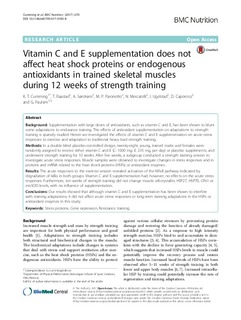| dc.contributor.author | Cumming, Kristoffer Toldnes | |
| dc.contributor.author | Raastad, Truls | |
| dc.contributor.author | Sørstrøm, Andreas Natvig | |
| dc.contributor.author | Paronetto, Maria Paola | |
| dc.contributor.author | Mercatelli, Neri | |
| dc.contributor.author | Ugelstad, Ingrid | |
| dc.contributor.author | Caporossi, Daniela | |
| dc.contributor.author | Paulsen, Gøran | |
| dc.date.accessioned | 2018-04-16T12:05:59Z | |
| dc.date.available | 2018-04-16T12:05:59Z | |
| dc.date.created | 2018-03-12T12:15:40Z | |
| dc.date.issued | 2017 | |
| dc.identifier.citation | BMC Nutrition. 2017, 3, 70. | nb_NO |
| dc.identifier.issn | 2055-0928 | |
| dc.identifier.uri | http://hdl.handle.net/11250/2494247 | |
| dc.description | This article is distributed under the terms of the Creative Commons Attribution 4.0 International License (http://creativecommons.org/licenses/by/4.0/), which permits unrestricted use, distribution, and reproduction in any medium, provided you give appropriate credit to the original author(s) and the source, provide a link to the Creative Commons license, and indicate if changes were made. The Creative Commons Public Domain Dedication waiver (http://creativecommons.org/publicdomain/zero/1.0/) applies to the data made available in this article, unless otherwise stated. | nb_NO |
| dc.description.abstract | Background: Supplementation with large doses of antioxidants, such as vitamin C and E, has been shown to blunt some adaptations to endurance training. The effects of antioxidant supplementation on adaptations to strength training is sparsely studied. Herein we investigated the effects of vitamin C and E supplementation on acute stress responses to exercise and adaptation to traditional heavy load strength training. Methods: In a double blind placebo-controlled design, twenty-eight, young, trained males and females were randomly assigned to receive either vitamin C and E (C: 1000 mg, E: 235 mg, per day) or placebo supplements, and underwent strength training for 10 weeks. After five weeks, a subgroup conducted a strength training session to investigate acute stress responses. Muscle samples were obtained to investigate changes in stress responses and in proteins and mRNA related to the heat shock proteins (HSPs) or antioxidant enzymes. Results: The acute responses to the exercise session revealed activation of the NFκB pathway indicated by degradation of IκBα in both groups. Vitamin C and E supplementation had, however, no effects on the acute stress responses. Furthermore, ten weeks of strength training did not change muscle αB-crystallin, HSP27, HSP70, GPx1 or mnSOD levels, with no influence of supplementation. Conclusions: Our results showed that although vitamin C and E supplementation has been shown to interfere with training adaptations, it did not affect acute stress responses or long-term training adaptations in the HSPs or antioxidant enzymes in this study. | nb_NO |
| dc.language.iso | eng | nb_NO |
| dc.subject | stress proteins | nb_NO |
| dc.subject | gene expression | nb_NO |
| dc.subject | resistance training | nb_NO |
| dc.title | Vitamin C and E supplementation does not affect heat shock proteins or endogenous antioxidants in trained skeletal muscles during 12 weeks of strength training | nb_NO |
| dc.type | Journal article | nb_NO |
| dc.type | Peer reviewed | nb_NO |
| dc.description.version | publishedVersion | nb_NO |
| dc.rights.holder | © The Author(s). 2017 | nb_NO |
| dc.source.volume | 3 | nb_NO |
| dc.source.journal | BMC Nutrition | nb_NO |
| dc.identifier.doi | 10.1186/s40795-017-0185-8 | |
| dc.identifier.cristin | 1572097 | |
| dc.description.localcode | Seksjon for fysisk prestasjonsevne / Department of Physical Performance | nb_NO |
| cristin.unitcode | 150,31,0,0 | |
| cristin.unitname | Seksjon for fysisk prestasjonsevne | |
| cristin.ispublished | true | |
| cristin.fulltext | original | |
| cristin.qualitycode | 1 | |
